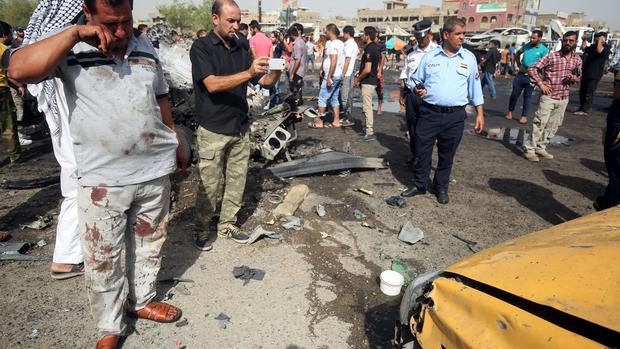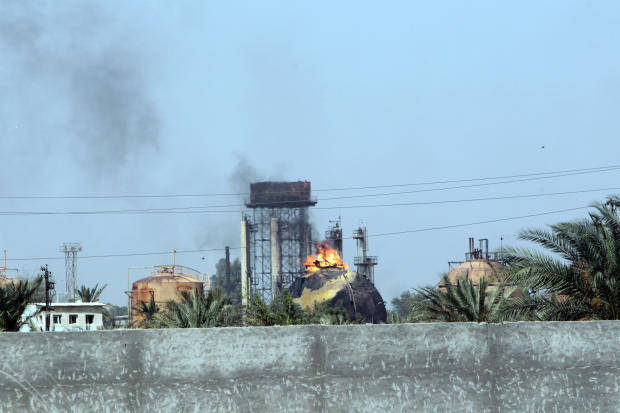Dozens killed as bombs tear through packed markets
BAGHDAD -- A wave of bombings struck outdoor markets and a restaurant in Shiite-dominated neighborhoods of Baghdad on Tuesday, killing at least 69 people, officials said - the latest in deadly militant attacks far from the front lines in the country's north and west where Iraqi forces are battling the Islamic State of Iraq and Syria (ISIS).
ISIS, which has been behind recent deadly attacks in the area, claimed responsibility for the deadliest attack, which took place in Baghdad's northeastern Shaab neighborhood and where at least 34 people were killed and 75 others were wounded.
ISIS controls significant areas in northern and western Iraq, including the country's second-largest city of Mosul.
In that attack, a roadside bomb first exploded outside the concrete blast walls surrounding the open-air market, followed by a suicide bomber who blew himself up as people gathered to help the victims of the first explosion, a police officer said.
The ISIS statement said the attack was carried out by an Iraqi who targeted members of Shiite militias.
Later Tuesday, officials said a second car bombing struck an outdoor market in the city's south, killing at least eight people. That explosion hit a fruit-and-vegetable market in the Shiite-dominated neighborhood of Dora.
The police say the Dora explosion also wounded 22 people.
In Baghdad's sprawling eastern Shiite district of Sadr City, a suicide car bombing hit a crowded outdoor market, killing 18 people and wounding 35 others.
In northeast Baghdad, a suicide bomber targeted a restaurant in the Habibiya neighborhood, killing nine and wounding 18.
Medical officials confirmed the casualty figures. All officials spoke on condition of anonymity as they were not authorized to talk to reporters.
ISIS did not immediately claim responsibility for the second or third attacks.
Commercial and public places in Shiite-dominated areas are among the most frequent targets for the Sunni militants seeking to undermine the Iraqi government efforts to maintain security inside the capital.
But ISIS has not confined its latest attacks only to Baghdad.
Earlier Tuesday, Iraqi oil workers resumed work at a natural gas plant north of Baghdad, two days after a coordinated dawn assault by ISIS left at least 14 people dead there, a senior Oil Ministry official said.
Sunday's spectacular attack in the town of Taji, about 12 miles north of Baghdad, saw a suicide car bombing at the facility's main gate, followed by several ISIS fighters breaking into the plant where they clashed with security forces for hours before the attackers were repelled.
The dead included six civilians and eight security forces while 27 Iraqi troops were wounded. Closed-circuit television images showed an explosion that sent thick black smoke rising above the plant. As flames engulfed the facility and nearby palm trees, pedestrians were seen running for cover. The top of one of the gas-processing units was blown off.
It took hours before Iraqi troops repelled the attackers.
On Tuesday, work at the plant's three production lines returned "to normal levels," said Deputy Oil Minister Hamid Younis.
The plant was back to full capacity of producing 30,000 cooking gas cylinders a day, he said, adding that Sunday's attack had only damaged two gas storages and a few pipelines.
Iraqi state TV showed workers in navy blue overalls filling metal and plastic cylinders on conveyor belts and forklift trucks loading cylinders into trucks.
The assault on Taji came as ISIS militants are being pushed back along several front lines in Iraq, prompting the Sunni extremists to increasingly turn to insurgency-style attacks to detract from their losses.
ISIS-claimed attacks have killed more than 200 people since last week in Iraq. After its 2014 blitz, ISIS declared an Islamic caliphate on the territory it holds in Iraq and Syria and at the height of its power was estimated to hold nearly a third of Iraq. Iraq's government says the group's hold has since shrunk to 14 percent of Iraq's territory.

